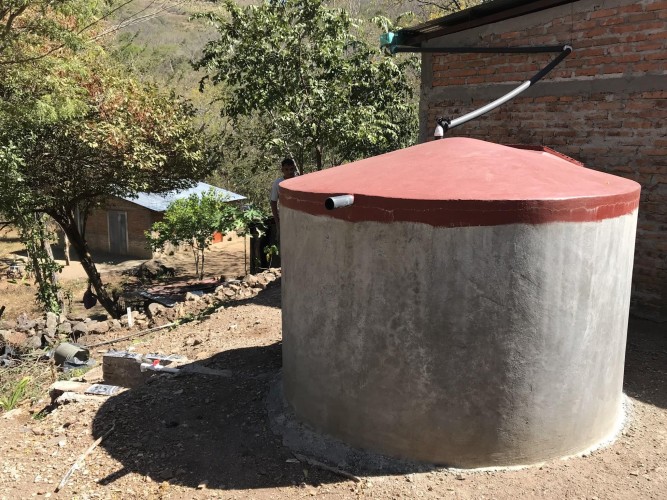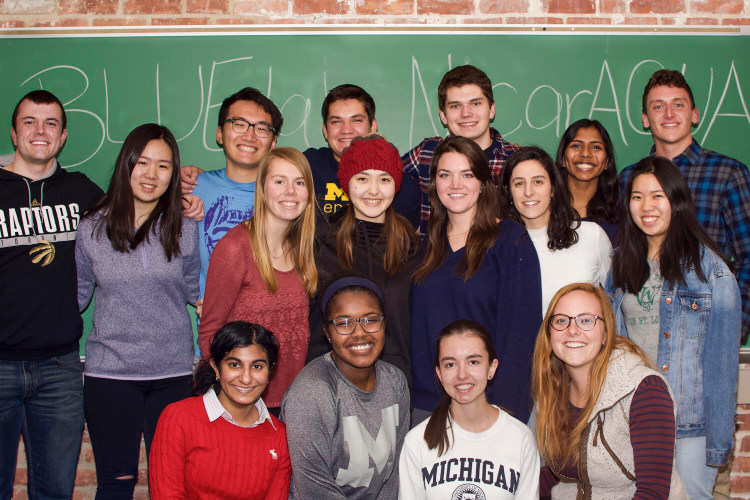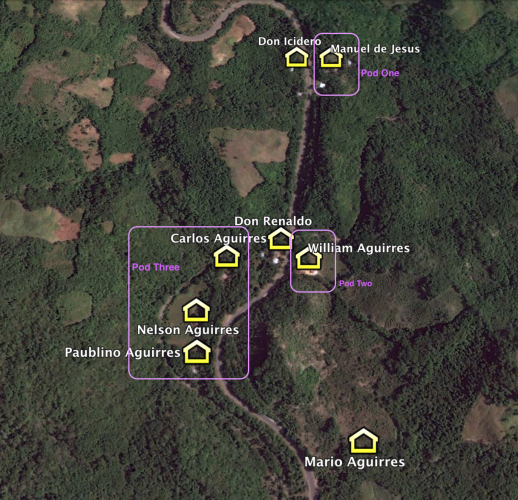The BLUElab NicarAGUA team, in partnership with FNE International, has been collaborating with the El Jicaral, Nicaragua community since September 2015. Since that time, three in-country trips have been conducted. First, in 2016, a preliminary needs assessment trip was conducted in the surrounding communities. Through extensive surveys and interviews with members of communities visited, it was determined that the greatest need of this community was access to water during the dry season.
After weighing the options the team decided that rainwater harvesting would be the most sustainable option for this community to improve their access to water during the dry season. The collected rainwater would then be stored in ferrocement water storage tanks. Ferrocement was chosen because of its price and familiarity to the community. After creating a design over the next academic year, in May 2017, several team members implemented two 5,000 L prototype storage tanks and installed gutters on two homes in the partner community. It was decided that the tanks would be used for all non-potable uses to supplement the potable water the community gets from existing, but insufficient, water infrastructure.

On our most recent trip in February 2018 was conducted primarily as an information gathering trip to prepare us for the next phase of our project in May. During the trip, the library mini grant funds were used to pay for lodging and transportation to the community so we could conduct crucial user feedback surveys. Over the span of 7 days, we set out to gather more information about: the community where we built the prototype systems (Las Banderitas), communities in the surrounding area of El Jicaral, and successful water projects in the Leon region. Additionally, we spent a lot of time in collaboration with the nonprofit Nuevas Esperanzas. In surveys that we conducted over the course of the trip, we aimed to learn about community needs related to water infrastructure, the potential for water committee structures, and the extent that community members are willing and able to invest their resources into the system.
In the first days of the trip, we were able to solidify a partnership with Nuevas Esperanzas. We were able to ask them many questions, both technical and social in nature. They currently focus on creating water systems such as rainwater catchment tanks and aqueducts in isolated communities located on the Telica Volcano. They are very willing to teach us more about their processes, in addition to helping us on our project in El Jicaral. This includes co-hosting a workshop with us on ferrocement tank construction in May with residents of Las Banderitas.
In Las Banderitas, we discovered that they have just established a water committee. It is comprised of five residents that are in charge of monitoring the new pumped well system, collecting payments to compensate for the energy for the pump, and hosting meetings with other community members.
We learned that the new pumped well in Las Banderitas fails as a consistent and reliable source of water. From conversations, we realized that there was substantial overuse of the system when it was first inaugurated, and it has since not supply enough water for the needs of each and every household. Additionally, they do not have meters on the system and only pay a flat monthly fee. In contrast, the recipients of the prototype tanks are very satisfied with the systems, prompting other community members requested tanks to met their water needs. In all, from our meeting with the community, our assessments, and feedback from the surveys, we have identified that there is a demand and need for us to continue implementing rainwater catchment systems in Las Banderitas.
From additional surveying in this community, other communities of El Jicaral, and the region of El Tololar, we concluded that continuing with rainwater harvesting systems would be a viable outcome of the workshop, and we plan to carry out the workshop as our next phase in Las Banderitas. Our assessment of other communities in El Jicaral confirms that Las Banderitas has a greater need for water sources than many other surrounding communities. Moreover, our assessment of other municipalities that do not have a prevalent water scarcity, El Tololar, also confirms that we should continue to work in this community to contribute to providing multiple sources of water. It is important to have multiple water supply options both for reliability and sustainability in these communities.
When we visited Las Banderitas, we also discussed the parameters of our project with the community’s water committee. While a need for additional water sources is recognized, it is not within our means to supply or completely fund a water tank for every household, nor do we want to foster community dependence on donations. Instead, we would like to promote local ownership in the project and facilitate local agency to establish a system that substantially and sustainably addresses their need. Therefore, we held meetings with residents of Las Banderitas and the newly-founded water committee of the community to discuss methods in which we can ensure every household is able to participate in the workshop and work to address their water supply challenges.
Our library mentor, Jaime Niehof, was critical to the success of this trip on several fronts. First, she helped us find resources on campus both for funding for our trip, which was crucial to make the trip a reality, and resources on effective surveying, which helped us create a comprehensive user feedback survey on qualtrics that was conducted during the trip. Jaime also gave us the idea to keep track of houses surveyed on google earth. It was due to the resources she provided and advice she gave us that this trip was successful at setting up the next part of our project.
Our Team

Team Members from back left: Braden Nyberg, Christine Oh, Kevin Shen, Seth Stump, Alec Distel, Sai Sivakumar, Cameron Beversluis, Grace Hankes, Halla Kabat, Brigitte Smith, Maria Zaccherini, Carolyn Wu, Seeta Goyal, Jeanna Washington, Emily Brady, Kristy Allen.
Not Pictured: Adam Assink, Erik Anderson, Jordan Keeley, Julia Stuart, Liye Xing, Maeve Skelly, Sam Rogers, Usman Khan, Wuhaj Ansari, William Yang
Moving forward, with the support of our partners FNE International and Nuevas Esperanzas, we will host a workshop in May with the community of Las Banderitas. Each household of Las Banderitas will have the opportunity to participate in the workshop and receive subsidized materials for each family pod to be able to build a tank themselves with our educational support. The water committee members will collaborate with us in various decision making for the workshop. The committee will also help us recruit participants for the workshop and communicate expectations.
Measurements of Las Banderitas Houses and Workshop Options
